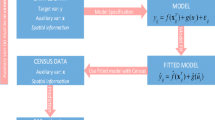Abstract
This paper is a reflection on the challenges of undertaking cross-country comparative research involving quantitative data in sub-Saharan Africa. It draws inspiration from the experience of attempting a comparative project involving the collection and analysis of secondary data from Kenya, Zambia and Zimbabwe for the Consuming Urban Poverty (CUP) project. Secondary city-level data on poverty and labour markets were required. Acquiring these smaller-scale, subject-specific data posed certain challenges. However, these challenges are not unique to these three countries. Thus, first, the paper focuses on the experience of attempting to conduct the specific CUP research in these countries. Then the discussion broadens to address the general challenges of conducting quantitative research in sub-Saharan Africa, especially at the level of the city.
Similar content being viewed by others
Notes
This work commenced in late 2015.
For a discussion of the issues of comparability and the problems with “official” poverty statistics in Zambia, see Chibuye 2014.
In the CUP project, Zimbabwe was a case in point: no micro-data set access, payment expected for any data received and having to move meetings with role-players out of areas where political violence was a threatened.
Two of these are in South Africa, and have mostly South African data sets: DataFirst at UCT in Cape Town and the South African Data Archive (SADA), National Research Foundation (NRF), Pretoria. The third is the Centre for Data Archiving, Management, Analysis and Advocacy (C-DAMAA), University of Cape Coast, Ghana.
Even for non-profit organizations, governments or academic institutions outside of the USA, ICPSR membership ranges from US$2,200 to US$16,550 annually (depending on the size of the institution and its use of data resources) (http://www.icpsr.umich.edu/icpsrweb/content/membership/join.html).
For example, Afrobarometer, which appears in the ICPSR repository, has its own Internet website and the data are free and open to use by anyone. The site is easily navigable and in less than four steps, any user anywhere in the world can download one of several rounds of Afrobarometer data for one of 38 African countries participating in the survey (http://afrobarometer.org/). These are also available from DataFirst.
I have included 51 countries and territories in SSA, 27 of which have online data catalogues listing micro-data sets, i.e. the majority.
References
African Union (AU). (2000). African charter on statistics. African Union: Togo.
Borgman, C. (2012). The conundrum of sharing research data. Journal of the American Society for Information Science and Technology, 63(6), 1059–1078.
Caporali, A., Morisset, A., & Legleye, S. (2015). Providing access to quantitative surveys for social research: the example of INED. Population-E., 70(3), 537–566.
Chibuye, M. (2014). Interrogating urban poverty lines: the case of Zambia. Environment and Urbanisation., 26(1), 236–256.
Corti, L. (2012). Recent developments in archiving social research. International Journal of Social Research Methodology., 15(4), 281–290.
Dale, A., & Elliot, M. (2001). Proposals for 2001 samples of anonymized records: an assessment of disclosure risk. Journal of the Royal Statistical Society: Series A., 164(3), 427–447.
DataFirst https://www.datafirst.uct.ac.za/.
England, J., & Bacchini, S. (2012). Dilemmas in archiving contemporary material: the example of the British Library. International Journal of Social Research Methodology., 15(4), 263–269.
Johnston, M. (2014). Secondary data analysis: a method of which the time has come. Qualitative and Quantitative Methods in Libraries (QQML)., 3, 619–626.
Joshi, M., & Krag, S. (2010). Issues in data management. Science and Engineering Ethics., 16(4), 743–748.
IPUMS-International https://international.ipums.org/international/about.shtml.
Kenya National Bureau of Statistics (KNBS). (2008). Data access and dissemination policy. KNBS: Nairobi.
Kirigyera, B. (2013). The dawning of a statistical renaissance in Africa. Paper presented at the conference African economic development: measuring success and failure, Simon Fraser University, Vancouver, April 18–20.
Kirigyera, B. (2015). The emerging data revolution in Africa: strengthening the statistics, policy and decision-making chain. Stellenbosch: African Sun Media.
Nguru, S. (2012). The 265 Districts of 2010. http://www.ustawi.info.ke/index.php/devolution/265-districts-of-2010.
Osuteye, E., Johnson, C., & Brown, D. (2016). The data gap: an analysis of data availability on disaster losses in sub-Saharan African Cities. Urban Africa Risk Knowledge (Ark) Background Paper. Working Paper No. 11.
Piwowar, H. A., Becich, M. J., Bilofsky, H., & Crowley, R. S. (2008). Towards a data sharing culture: recommendations for leadership from academic health centers. PLoS medicine., 5(9), e183.
Sachs, J. (2012). From millennium development goals to sustainable development goals. Lancet, 379, 2206–2211.
Satterthwaite, D. (2016). Background paper: small and intermediate urban centres in sub-Saharan Africa. Urban Africa Risk Knowledge (Urban ARK) Working Paper 6.
Tenopir, C., Allard, S., Douglass, K., Aydinoglu, A., Wu, L., Read, E., Manoff, M., & Frame, M. (2011). Data sharing by scientists: practices and perceptions. PloS One, 6(6), e21101.
United Nations Economic Commission for Europe Conference on European Statistics (UNECE). (2007). Managing statistical confidentiality and microdata access: principles and guidelines of good practice. New York: United Nations.
United Nations. (2015a). The Millenium Development Goals Report 2015. New York: United Nations.
United Nations. (2015b). Transforming our world: the 2030 Agenda for Sustainable Development. Resolution A/RES/70/1. New York: United Nations.
United Nations Development Programme (UNDP) and the World Bank Group (WBG). (2016). Transitioning from the MDG’s to the SDG’s. New York: United Nations.
Woolfrey, L. (2009). Knowledge utilization for governance in Africa: evidence-based decision-making and the role of survey data archives in the region. Information Development, 25, 22–32.
Woolfrey, L. (2013). Leveraging data in African countries: curating government microdata for research. A DataFirst Technical Paper Number 22. Cape Town: DataFirst, University of Cape Town.
Acknowledgements
This work forms part of the Governing Food Systems to Alleviate Poverty in Secondary Cities in Africa project, funded under the ESRC-DFID Joint Fund for Poverty Alleviation Research (Poverty in Urban Spaces theme). The financial support by the Economic and Social Research Council (UK) and the UK Department for International Development [grant number ES/L008610/1] is gratefully acknowledged.
Author information
Authors and Affiliations
Corresponding author
Rights and permissions
About this article
Cite this article
Borel-Saladin, J. Data Dilemmas: Availability, Access and Applicability for Analysis in Sub-Saharan African Cities. Urban Forum 28, 333–343 (2017). https://doi.org/10.1007/s12132-017-9320-5
Published:
Issue Date:
DOI: https://doi.org/10.1007/s12132-017-9320-5




